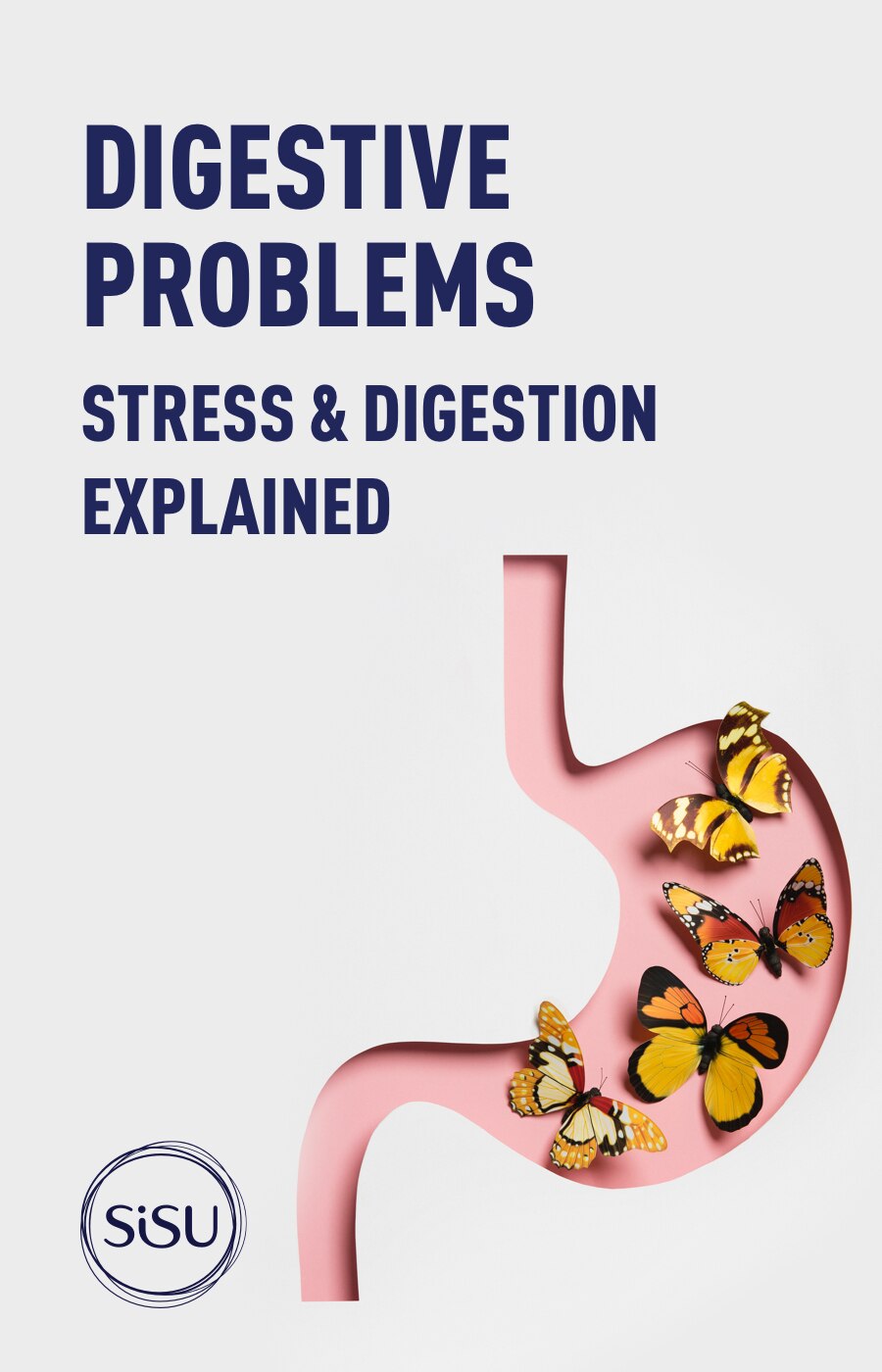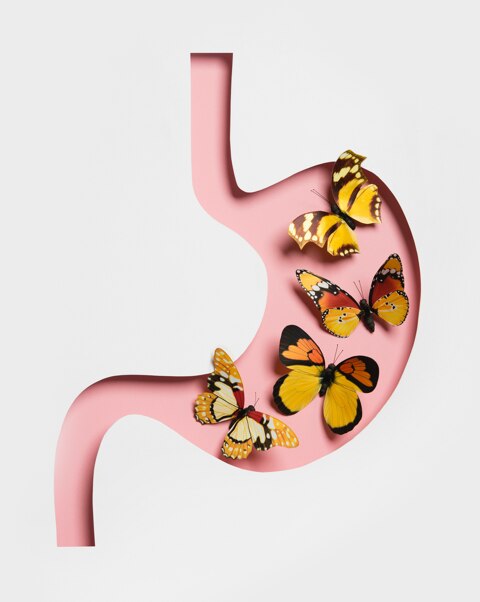
Digestive problems
When working optimally, the digestive system is a well-oiled machine, breaking down food to fuel every cell in the body. On the other hand, when something isn’t working correctly, this can impact your digestive system as a whole. More than 20 million Canadians suffer from digestive disorders every year.1 These include IBS, Crohn’s, ulcerative colitis, constipation, and diarrhea.
While the direct cause of these conditions is unknown, due to the close relationship between the gut, brain, and the immune system, experts suspect stress or an immune system malfunction could be connected.2 3
How does the digestive system work?
There are two parts of digestion; mechanical and chemical. Chemical digestion involves breaking down food into simpler nutrients that can be used by the cells.
Chewing breaks down food (mechanical digestion) and a specific enzyme found in the saliva, called amylase, starts the digestion process of carbohydrates (chemical digestion). From there, the esophagus muscles move the food into the stomach. It’s the stomach’s job to mix everything up with gastric juices (yum) and turn the food into a substance called chyme, a churned mixture of partially digested food and stomach acid. We hope you’re not reading this while eating lunch!
The stomach then sends this mixture to the small intestine, which uses substances made by the pancreas and liver to digest food and absorb its beneficial nutrients. 90% of digestion takes place in the small intestine, where nutrients are removed from food and enter the bloodstream.4 IBS, Crohn’s, and celiac disease are all problems of the small intestine.
After retrieving the nutrients, the small intestine empties the leftover matter into the large intestine, where the removal of water takes place, leaving behind solid waste known as stool.
What is the microbiome?
Before we can understand the complex and robust relationship between stress and digestion, we must first get acquainted with the microbiome. The microbiome is a collection of trillions of microbes (bacteria, fungi, protozoa, and viruses) which outnumber human cells ten to one!5 These microscopic organisms help digest our food, fight off disease-causing bacteria, regulate the immune system, and produce B vitamins, thiamine and riboflavin, and vitamin K.6
The skin, nose, mouth, stomach, and intestines are home to microbes.7 These tiny organisms have enormous importance. The immune system relies on them, so much so, that many autoimmune diseases are associated with a weakened microbiome.8
Microbes in the gut specifically, known as the gut microbiota, are responsible for producing neurotransmitters and hormones. The gut microbiota produces neurotransmitters such as serotonin, dopamine, and GABA, all of which play a crucial role in mood and reactions to stress.9 10 Turns out your feelings of hanger, aren’t just in your head.
Because the microbiome was not widely recognized by the western scientific and medical community until the early 2000s, there is still much to study and learn.11
Stress and digestion
A study found that the diversity of bacteria in the microbiome could be related to how resistant you are to stress and immune-related disorders.12 So, what’s the connection between stress and gut health?
Over time, chronic stress can alter the bacteria in our gut.13 Stress typically triggers what’s known as the fight-or-flight response, a reaction that acts as a survival mechanism, in distressing situations.14 What once helped our prehistoric ancestors decide whether to fight off a mountain lion or run away still exists in our DNA today. Though, if you’re lucky, your stresses are more likely to consist of someone cutting you off on the way to work.
While it may seem unreasonable, our brain sounds the alarm for both scenarios which triggers the release of cortisol and other hormones that disturb the microbiota.15 16 Also, during periods of stress, blood and energy are diverted away from your digestive system, because your body doesn’t want to prioritize resting and digesting during an alarming situation.17
Over time, as one would imagine, stress can take a real toll on the bacteria that protect us.
What is IBS?
The Canadian Digestive Health Foundation estimates at least 5 million Canadians have Irritable Bowel Syndrome (IBS).18 IBS is a chronic condition that affects the lower GI tract, the small and large intestines.19 Signs and symptoms include cramping, abdominal pain, bloating, gas, diarrhea, or constipation.20
While the exact cause of IBS is unknown, experts suspect it’s a result of a combination of things; abnormal gastrointestinal (GI) tract movements, increased awareness of bodily functions, and a disruption in the communication between the brain and the GI tract.21 In some cases, stress can trigger and worsen IBS.22
Studies have shown avoiding foods that trigger symptoms, eating high-fibre foods, drinking plenty of fluids, exercising regularly, and getting enough sleep may be helpful in reducing mild IBS symptoms.23
 Antibiotics and probiotics
Antibiotics and probiotics
Antibiotics are critical for treating bacterial infections. However, many common antibiotics that destroy the harmful bacteria that can cause life-threatening infections, also end up killing off the good bacteria in the microbiota.24 25
Overusing antibiotics can cause a resistance to them, and can harm the good bacteria we need to help us stay healthy.26 This damaging of healthy bacteria is why you may have heard people recommend eating foods rich in prebiotics after taking antibiotics.
How to maintain healthy digestion
You can maintain a healthy digestive system by eating foods rich in fibre (fruits and vegetables), drinking plenty of water (1.5-2 litres per day), managing your stress, regularly exercising, and eating prebiotic foods.27
Prebiotics are foods that feed the good bacteria in your gut. Foods rich in prebiotics include:28
| Vegetables | Artichokes, chicory, garlic, onion, leek, shallots, spring onion, asparagus, beetroot, fennel bulb, green peas, snow peas, and sweetcorn. |
| Legumes | Chickpeas, lentils, red kidney beans, baked beans, and soybeans. |
| Fruit | Custard apples, nectarines, white peaches, persimmon, tamarillo, watermelon, rambutan, grapefruit, pomegranate, and dried fruit (e.g. dates, and figs). |
| Bread / cereals | Barley, rye bread, rye crackers, pasta, gnocchi, couscous, wheat bran, and oats. |
| Nuts and seeds | Cashews, and pistachio nuts. |
By prioritizing these healthy lifestyle tips, you’ll be giving your digestive system the support it needs to run smoothly.
Keep learning with us by following Sisu on Instagram.
If you have health problems, please seek help from a healthcare practitioner. Always check with a healthcare practitioner before taking a nutritional supplement. These recommendations are for information and education purposes.
1 https://cdhf.ca/digestive-disorders/
2 https://www.mayoclinic.org/diseases-conditions/inflammatory-bowel-disease/symptoms-causes/syc-20353315
3 https://www.hopkinsmedicine.org/health/wellness-and-prevention/the-brain-gut-connection
4 https://www.news-medical.net/health/What-Does-the-Small-Intestine-Do.aspx
5 https://depts.washington.edu/ceeh/downloads/FF_Microbiome.pdf
6 https://depts.washington.edu/ceeh/downloads/FF_Microbiome.pdf
7 https://kids.frontiersin.org/article/10.3389/frym.2017.00035
8 https://depts.washington.edu/ceeh/downloads/FF_Microbiome.pdf
9 https://www.theatlantic.com/health/archive/2015/06/gut-bacteria-on-the-brain/395918/
10 https://www.sciencedirect.com/science/article/pii/S2352154618301608
11 https://www.britannica.com/science/human-microbiome
12 https://www.sciencedirect.com/science/article/pii/S2352289515300370
13 https://www.ncbi.nlm.nih.gov/pmc/articles/PMC6143810/
14 https://www.health.harvard.edu/newsletter_article/stress-and-the-sensitive-gut
15 https://www.health.harvard.edu/staying-healthy/understanding-the-stress-response
16 https://pubmed.ncbi.nlm.nih.gov/29306937-the-effects-of-stress-and-meditation-on-the-immune-system-human-microbiota-and-epigenetics/
17 https://www.healthline.com/nutrition/ways-to-improve-digestion#section5
18 https://cdhf.ca/digestive-disorders/irritable-bowel-syndrome-ibs/what-is-irritable-bowel-syndrome-ibs/
19 https://www.cedars-sinai.org/health-library/diseases-and-conditions/i/irritable-bowel-syndrome-ibs.html
20 https://www.mayoclinic.org/diseases-conditions/irritable-bowel-syndrome/symptoms-causes/syc-20360016
21 https://www.emedicinehealth.com/irritable_bowel_syndrome/article_em.htm
22 https://www.healthline.com/health/ibs-c/stress-and-anxiety#1
23 https://www.mayoclinic.org/diseases-conditions/irritable-bowel-syndrome/diagnosis-treatment/drc-20360064
24 https://microbiologysociety.org/members-outreach-resources/outreach-resources/antibiotics-unearthed/antibiotics-and-antibiotic-resistance/what-are-antibiotics-and-how-do-they-work.html
25 https://www.healthline.com/nutrition/what-to-eat-antibiotics#section1
26 https://www.healthline.com/nutrition/what-to-eat-antibiotics#section1
27 https://www.healthline.com/nutrition/ways-to-improve-digestion#section8
28 https://www.monash.edu/medicine/ccs/gastroenterology/prebiotic/faq



